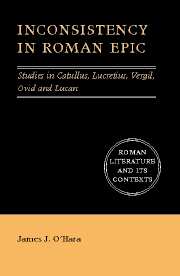Book contents
- Frontmatter
- Contents
- Acknowledgments
- Introduction
- 1 Greek versions
- 2 Catullus 64: Variants and the virtues of heroes
- 3 Death, inconsistency, and the Epicurean poet
- 4 Voices, variants, and inconsistency in the Aeneid
- 5 Inconsistency and authority in Ovid's Metamorphoses
- 6 Postscript: Lucan's Bellum Civile and the inconsistent Roman epic
- Bibliography
- Index of passages discussed
- General index
4 - Voices, variants, and inconsistency in the Aeneid
Published online by Cambridge University Press: 12 January 2010
- Frontmatter
- Contents
- Acknowledgments
- Introduction
- 1 Greek versions
- 2 Catullus 64: Variants and the virtues of heroes
- 3 Death, inconsistency, and the Epicurean poet
- 4 Voices, variants, and inconsistency in the Aeneid
- 5 Inconsistency and authority in Ovid's Metamorphoses
- 6 Postscript: Lucan's Bellum Civile and the inconsistent Roman epic
- Bibliography
- Index of passages discussed
- General index
Summary
In the Aeneid we read that Aeneas will have a son in old age, and that he has only three more years on earth; that Helen both openly helped the Greeks enter Troy, and (if Vergil wrote that passage) that she cowered in hiding in fear of punishment; that Aeneas' Trojan son Ascanius will be the ancestor of the Alban kings, and that his half-Italian son Silvius will be; that Theseus escaped from the underworld, and that he is still there; that the Italians were peaceful before the arrival of the Trojans and that they were warlike; that Aeneas is fighting on the side of Jupiter, and that he is like a monster fighting against Jupiter; that Palinurus fell from Aeneas' ship the day before Aeneas met him in the underworld, and that he fell three or four days before; that Aeneas will impose customs on the Italians he conquers in Italy, and that the Italians will keep their own customs; that Jupiter both predicted and forbade the war in Italy, and that he both was impartial and gave help to one side; that the golden bough will yield willingly and easily or not at all, but then that it yields only hesitantly to Aeneas.
The Aeneid clearly lacked Vergil's final polish when he died in 19 bce, for it is the only extant hexameter poem with unfinished lines (it has fifty-eight), and biographical and scholarly tradition soon began to assert both that the poet was planning three years of revisions to his poem after the trip to Greece on which he died, and that it was possible to identify certain passages that he “would have corrected, if death had not intervened.”
- Type
- Chapter
- Information
- Inconsistency in Roman EpicStudies in Catullus, Lucretius, Vergil, Ovid and Lucan, pp. 77 - 103Publisher: Cambridge University PressPrint publication year: 2007
- 2
- Cited by

